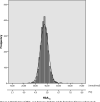brainnotyetdead
Member
- Messages
- 7
- Type of diabetes
- Type 2
- Treatment type
- Insulin
Hello everyone! :hello:
I'm curious to see whether anyone else has experience any of the below, it would be great to hear your experiences and share advice where applicable.
Here's the explanation/brief background:
I was taking Mounjaro, and initially, at the 2.5mg and then the 5mg dosage, everything was fine. When I hit 7mg, I suffered some really bad side effects, I was extremely breathless, I could barely make it up the stairs and my heart was palpitating. I've since stopped taking Mounjaro (with the Diabetic Nurse knowing) and I feel so much better, and I'm sleeping so much better also.
However, I'm also taking the maximum dosage of Metformin SR, as well as Farxiga (dapagliflozin). I understand that my GP just wants me to have better controlled blood sugars, but I feel over-prescribed, and the side-effects associated with these medications are almost (but not quiet!) turning me into a zombie. I also have concerns about the effectiveness of these medications. I've been Type II since January 2012 and during the last 13 years my blood sugars have increased, and this is because I overeat (I'm just being honest), and I definitely had a thing for sugary food.
I have been able to put my Diabetes into remission twice before, but it required a sustainable and bloody hard effort, and now my personal circumstances have changed for the better, I've just begun the process of trying my very best to get my sugars into the non-diabetic range as best I can, without Mounjaro, and I'm hoping I'll be able to reduce the Metformin and Farxiga (dapagliflozin) overtime.
Here are my questions:
I'm curious to see whether anyone else has experience any of the below, it would be great to hear your experiences and share advice where applicable.
Here's the explanation/brief background:
I was taking Mounjaro, and initially, at the 2.5mg and then the 5mg dosage, everything was fine. When I hit 7mg, I suffered some really bad side effects, I was extremely breathless, I could barely make it up the stairs and my heart was palpitating. I've since stopped taking Mounjaro (with the Diabetic Nurse knowing) and I feel so much better, and I'm sleeping so much better also.
However, I'm also taking the maximum dosage of Metformin SR, as well as Farxiga (dapagliflozin). I understand that my GP just wants me to have better controlled blood sugars, but I feel over-prescribed, and the side-effects associated with these medications are almost (but not quiet!) turning me into a zombie. I also have concerns about the effectiveness of these medications. I've been Type II since January 2012 and during the last 13 years my blood sugars have increased, and this is because I overeat (I'm just being honest), and I definitely had a thing for sugary food.
I have been able to put my Diabetes into remission twice before, but it required a sustainable and bloody hard effort, and now my personal circumstances have changed for the better, I've just begun the process of trying my very best to get my sugars into the non-diabetic range as best I can, without Mounjaro, and I'm hoping I'll be able to reduce the Metformin and Farxiga (dapagliflozin) overtime.
Here are my questions:
- There's something particularly awful this time about going into remission. I would normally expect some brain fog and dizziness and blurred eye sight, but this time has been on a completely different and incredibly difficult level. I assume it's because my sugars have been high for a while, and I'm definitely feeling better, but I'm curious to know whether anyone else has experienced this, and whether anyone has any thoughts on when you should put these side-effects down to the "body getting used to it", or actually, "this is quite serious, go see a doctor", and if you have seen a Doctor - did they/were they able to do anything to help? It's possible I've reduced my carb intake too much too quickly, but I've never been able to have "just a bit of a carb" - it's more-ish, and it also sends my sugars sky high.
- I'm also a big man (build wise), I'm over 6ft 3inches tall (191cm), and a wide, sturdy build, and I can't help but struggle with this idea that all people (not matter their age or size), should have blood sugars between the range of 4-6mmol ( as a guideline ). It seems weird to me a little old lady of 70 with a frail and fragile should have similar blood sugars to a middle-aged man who is 6ft 3+?

